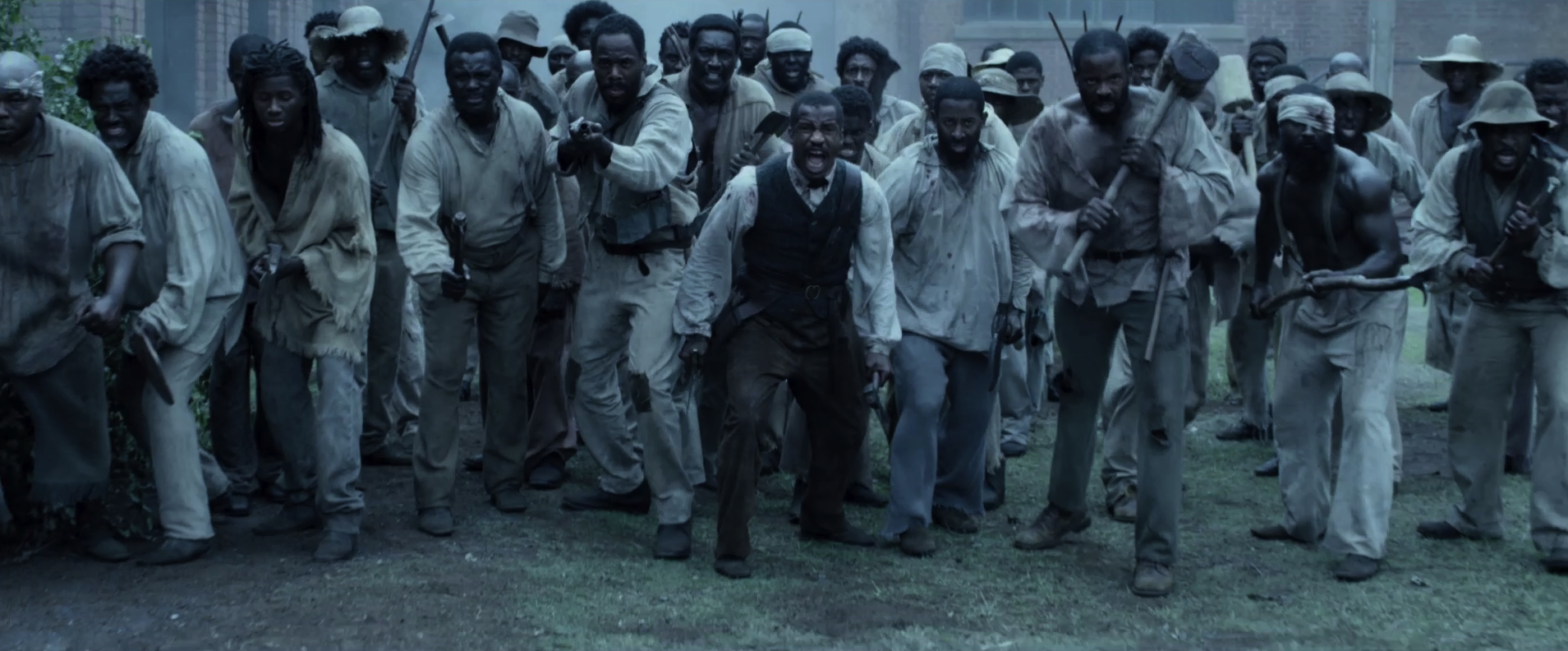
MPAA Rating: R | Rating: ★★½
Release year: 2016
Genre: Drama, History Director: Nate Parker
The Birth of a Nation is angry, violent, and prone to hero worship. It worships Nat Turner, the preacher-turned-revolutionary who stirred up a rebellion against white slave owners in 1800s Virginia. It also worships Nate Parker, the film’s director, producer, screenwriter, and actor. This is clearly a passion project for Parker, and while the controversy surrounding his personal life remains, I hope to evaluate his art as I imagine he’d intend it to be judged–not based on him, but based on the film itself. Still, with his fingerprints all over this, it’s difficult to separate the art from the artist. So it pains me to write that this film, while ambitious and sincere, and clearly will a powerful film for many viewers, is akin to the man it tries to worship–an enthusiastic noble failure.
The Bible plays a key role in Birth as a primary inspiration for both of Nat Turner’s vocations–as a preacher, and as the leader of a slave rebellion. He learns to read as a boy from his owner (Penelope Ann Miller), then begins as an itinerant preacher for prophet at the behest of her son and his primary owner, Samuel Turner (Armie Hammer). Apart from his frequent drinking and occasional outburst, Hammer’s Turner is mostly kind, or at least isn’t as vicious as the various owners Parker’s Turner encounters as he preaches at other plantations. Seeing the violence done to other slaves gets under his skin until it bursts forth in sermonic fervor in a passionate diatribe about the Lord’s justice against enemies and the new song which will be sung by those under oppression. Up until this point, the Bible has been used as a sort of pacifier, a weapon one own describes as more frightening than his pistol–if the slaves are obedient to their masters, perhaps they’ll enter into heaven. But the Bible can also be a weapon for the other position. In a compelling scene, Turner spits anti-slavery Bible verses into the face of a white reverend, who realizes he’s being out-exegeted by a supposedly ignorant slave. After Turner recovers for the subsequent lashing he receives for his insubordination, he’s a changed man with a new vocation–kill the white people in the name of God. The Bible started Turner’s journey, and it’ll be what ends it. In all this, the Bible is both oppressive and subversive, both protagonist and antagonist. It demands to be applied.
While the film lacks in compelling narrative pacing and acting, there are a few key scenes which stand out visually: a young white girl playfully leading a young black girl with a leash around her neck stands out; lynched bodies hanging from a tree as the camera zooms out while Nina Simone’s “Strange Fruit” rings out; the brief shot of a husk of a bleeding husk of corn. The performances are mostly forgettable. Jackie Earle Haley plays a version of the same greasy villain he portrays in every film lately. Hammer and Miller are adequate in their respective roles, but honestly pale in comparison to Parker, whose performance is front and center, and deservedly so. After all, this is The Nate Parker Film.
As I see it, The Birth of a Nation is the anti-Selma, Ava DuVernay’s exceptional 2014 film on Martin Luther King Jr. and the events in Selma, Alabama during the civil rights movement of the 1960s. (Trivia: Both films feature actor Colman Domingo in key supporting roles.) Where Selma clearly reveres King’s leadership and faith, it also portrays him as a troubled and broken man, one who questions his own calling and place within history. In contrast, the opening scenes of Birth are a religious ceremony celebrating Turner, still a boy, as a prophet and a leader of his people. Turner’s calling to band together slaves and kill their white masters is never questioned–his actions are a direct line from God, a prophetic vocation in the vein of Moses, Gideon, and David, where the sword of justice must be used to wipe out God’s enemies. Where King kneeled in non-violent resistance, Turner swings an axe into his drunken owner’s chest. Where Selma humanizes King, Birth deifies Turner. When Turner’s rebellion–a remarkably small part of the film, both in scope and in narrative–ultimately falls apart, Turner is celebrated as a heroic martyr, even a Christ figure. So many scenes point to this lionization, from the prophetic opening to the various dream sequences depicting Turner in a blue-tinted forest to the final angelic vision. Literally, Turner sees an angel. Whether you find this approach compelling likely depends on whether or not you approve of the vengeful bloodshed in the film’s climactic moments. I didn’t, and I don’t.
The Birth of a Nation brought James Cone to my mind. A theologian who is the father of black liberation theology, Cone wrote this in his seminal book, God of the Oppressed: “The scandal is that the gospel means liberation, that this liberation comes to the poor, and that it gives them the strength and the courage to break the conditions of servitude.” Cone can often have an angry tone, one which points out white Christians’ guilt in remaining silent (at best) or being actively prejudiced and oppressive (at worst) regarding their black neighbors. It’s an uncomfortable book, even a controversial and disturbing book, but one which needs to be considered in the conversation regarding race, religion, and one’s response. Perhaps Cone has a filmic friend in Birth and Nate Parker. While The Birth of a Nation is not necessarily a good film in either its formal elements nor in its ultimate campaign of violence, it’s still a worthy film of discussion and consideration. Perhaps just not consideration for the Oscars.
IMDB Listing: http://www.imdb.com/title/tt4196450/